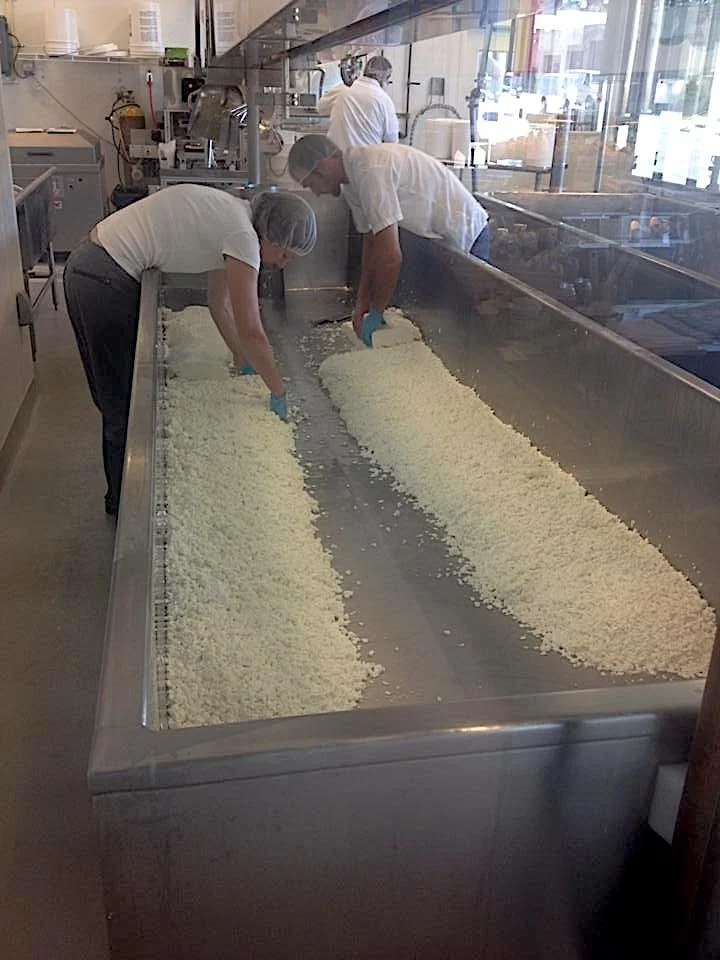Editor’s note: The cheese business is filled with family run creameries and dairies. Family businesses come with many challenges as well as advantages. In honor of Father’s Day we spoke with father and son at Clock Shadow Creamery to learn some of the ways they make it work.
Milwaukee-based Cedar Grove Cheese Inc. opened in 1878, near Milwaukee. Today the company produces organic, specialty cheeses, and cheese curds, free of rBGH and GMOs. Bob Wills and his wife, Beth Nachreiner, bought the company from his father-in-law, Ferdie. But Bob says transitioning ownership from Ferdie to the couple, had some significant challenges.
Clock Shadow Creamery shop photo credit Clock Shadow
Fortunately, he sees a different work dynamic with his son, Bo, at the family’s spinoff business, Clock Shadow Creamery. Founded in 2012, the company’s second location opened just over 10 years ago. And Bob believes one of his greatest business assets is working with Bo, who is current business manager for Clock Shadow Creamery. “I am giving Bo a huge amount of leeway,” he says. “I’m finding that balance regarding how to hand-off responsibility.”
“I joined the company about seven years ago, in 2015,” Bo says. “I jumped in as a sales manager, which coincided with the current person leaving. Before that I had worked in most every position at Cedar Grove Cheese, including doing grounds maintenance.”
Clock Shadow Creamery cheese curds photo credit Clock Shadow Creamery
Clock Shadow Creamery mostly focuses on fresh cheese production and especially cheese curds. Most customers are wholesale, but the company also provides curds to several retailers. In addition, they craft some hard cheeses and spreadable cheese. “We primarily focus on fresh production, but we do work with a farmer who ages the cheese himself without taking up space in our plant,” Bob says.
Bob and Bo Wills photo credit Clock Shadow Creamery
Define Professional Roles
Bob and Bo have a satisfying, and sustainable work relationship. “I treat Bo as a professional and I think we’ve gotten pretty good at that,” Bob says. “[We try] not to fall into father and son mode when we’re working. [But] it’s really nice to have someone whose motivation is unquestionable. And we can have easy conversations, with good communication.”
Father and son also make sure that other employees know Bo’s not getting preferential treatment and they may still freely express any concerns. “[Their opinions] will be considered in a normal professional way,” Bob says.
Clock Shadow cheesemaking credit Clock Shadow Creamery
Respect Each Other
Bo appreciates feeling that he doesn’t need to worry about ‘overreaching,’ in the business. “I can easily get questions answered for anything I might need,” he says. “I look at Dad as my boss when I’m at work. Bob is a very good resource, as far as the cheese industry goes. Even if we weren’t related, I would like to work with him.”
Bob agrees the cheese industry requires a lot of specific knowledge, which often exists among family-owned cheese businesses. “We’re always looking for people to work with us,” he says. “All the family-run cheese companies are very supportive of each other and of passing knowledge on to the next generation.
“But I think ― like many industries ― there’s a lot of consolidation going on and increasingly large costs of doing business. It seems that it will become increasingly hard to pass a business on to the next generation with larger companies running many of them now.”
Keep Work at Work
Bo appreciates being able to see and talk to his dad more frequently than if they didn’t work together. Bob feels the same way. “Bo has a younger brother who’s off in New York, and a sister [elsewhere] in Wisconsin, so it’s nice to have an excuse to keep in touch with one of our kids,” he says.
But Bo and Bob are also extremely careful about having work-related conversations outside of the business. “When we’re with other family members we have to be careful about keeping work conversations compartmentalized,” Bob says.
Bo agrees. “Family might be interested in big-picture stuff, but there’s no reason to talk about work at Christmas dinner. I most likely want to stick with the family business, but I don’t see my siblings doing that.”

